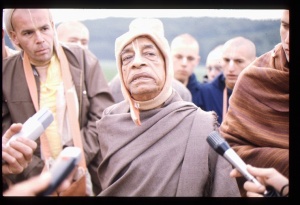CC Madhya 18.108 (1975)

A.C. Bhaktivedanta Swami Prabhupada
TEXT 108
- kintu kāhoṅ 'kṛṣṇa' dekhe, kāhoṅ 'bhrama' māne
- sthāṇu-puruṣe yaiche viparīta-jñāne
SYNONYMS
kintu—but; kāhoṅ—where; kṛṣṇa—Kṛṣṇa; dekhe—one sees; kāhoṅ—where; bhrama māne—mistakes; sthāṇu-puruṣe—the dry tree and a person; yaiche—as; viparīta-jñāne—by understanding one to be the other.
TRANSLATION
"But where they are seeing Kṛṣṇa is their mistake. It is like considering a dry tree to be a person."
PURPORT
The word sthāṇu means "a dry tree without leaves." From a distance one may mistake such a tree for a person. This is called sthāṇu-puruṣa. Although Śrī Caitanya Mahāprabhu was living in Vṛndāvana, the inhabitants considered Him an ordinary human being, and they mistook the fisherman to be Kṛṣṇa. Every human being is prone to make such mistakes. Śrī Caitanya Mahāprabhu was mistaken for an ordinary sannyāsī, the fisherman was mistaken for Kṛṣṇa, and the torchlight was mistaken for bright jewels on Kālīya's hoods.